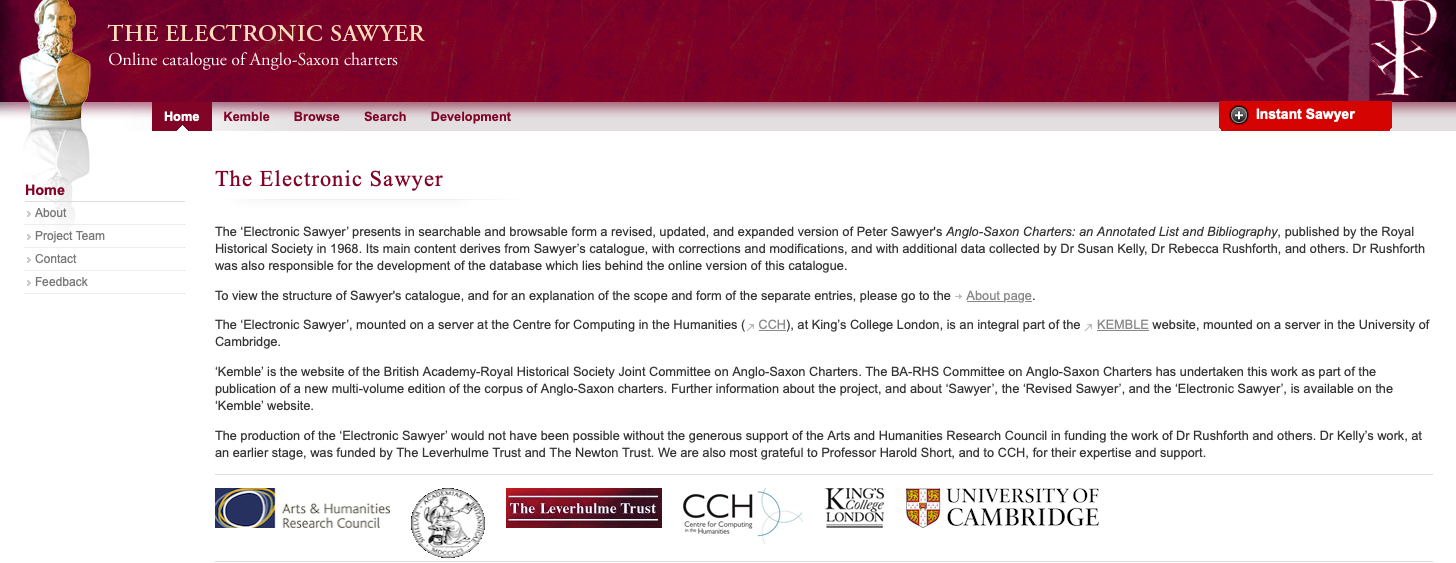Digital Resources for Medieval Research and Teaching
Posted by Catherine Rider
11 May 2017
There has been a huge proliferation of online resources for research and teaching in Medieval Studies in recent years, so much so that it’s hard to keep track of them all. So we’ve put our heads together and come up with a list of some of our favourites – though this is by no means exhaustive. We hope this will be useful to people researching at all levels but it may come in particularly handy for our second-year undergraduates, who are beginning to think about dissertation topics at this time of year, and for our MA students who are getting started on their dissertation research in earnest.
General Reference for a wide variety of topics and periods
- The Internet Medieval Sourcebook, a large (if slightly patchy) archive of translated sources; some are full texts, others extracts.
- The International Medieval Bibliography (provided by Brepols, access through the Uni e-library search engine); MLA Bibliography (access ditto) – these are the two main resources for finding research that’s been produced on a topic. The latter is specific to Modern Languages research, the former is Medieval Studies.
- Online dictionaries – for French, the Anglo-Norman Dictionary and the DEAF (Dictionnaire électronique d’ancien français available in French or German only) are the best. For Latin, the DMLBS (Dictionary of Medieval Latin from British Sources as well as the online Lewis and Short. For English, the Middle English Dictionary (MED).
- British History online is very useful for following up charters, roll entries, etc. The search facility is quite good as it has a wild card option, though you will need to anticipate the variant forms of a name in order to find everything relevant.
- In French, but covering primary material in various languages including Latin, is arlima.net (Archives de literature du moyen âge). A good place to start when looking for lists of manuscripts of a particular work, basic information e.g. about authorship and length, or bibliographical suggestions. The completeness of entries is rather uneven (some are excellent, some are basically shells) but it is being updated all the time.
- http://www.medievalarchaeology.co.uk/ Portal for Europe’s foremost society for the study of medieval archaeology; contains many useful links.
- Pastscape: Online database for the historic environment in England and a key starting point for the study of any medieval site or building.
- Digimap allows users to find and download Ordnance Survey maps of any date and scale; invaluable for researching medieval landscapes, sites and settlements and depicting them.
More specific sites that we like, in no particular order:
- http://www.esawyer.org.uk/about/index.html and http://dk.usertest.mws3.csx.cam.ac.uk/ for Anglo-Saxon charters. The former provides texts of (almost) all Anglo-Saxon charters as well as summaries of modern scholarly commentary, alongside full details of all surviving manuscripts etc., whilst the latter is something of a companion site, which for those signed up provides images of almost all surviving single sheets, along with maps and other useful materials for teaching (and studying) Anglo-Saxon England.
- The Monastic Manuscript Project site, especially the page containing a list of links to archives and libraries with digitized medieval holdings It’s presented as a resource for the study of early medieval monasticism, but, really, it’s of use to anyone working on medieval manuscripts.
- Parliament Rolls of Medieval England. An outstanding digital edition of an invaluable primary source for medieval political history.
- Wellcome Images: database of images from the collections of the Wellcome Library in London. Invaluable for studying the history of medicine (European and worldwide) but also much on manuscripts, religion, science and more. The Library also runs a blog, with some good medieval content.
- Thesaurus Exemplorum Medii Aevi – database of stories and motifs in medieval exempla, useful for finding references to particular topics or establishing which authors tell which stories. A French site but it provides some English keywords for searching.
- Medieval Francophone Literary Culture Outside France is one of the most significant recent digital projects in medieval literary studies – it explores the transmission and mobility of Francophone literature across Europe via a database of the manuscripts of six important textual traditions, including Classical material (romances of Alexander and Troy, Histoire ancienne jusqu’à César) and Arthurian romance (Lancelot, Tristan).
- Finally, for information on French-language and Occitan-language material specifically, Jonas, the ‘Repertoire des texts et des manuscrits médiévaux doc et d’oïl’. Again, this is a resource which is improving all the time, and aims for exhaustivity.
Thanks to Helen Birkett (History), Oliver Creighton (Archaeology), Tom Hinton (Modern Languages), Elliot Kendall (English) and Levi Roach (History) for suggesting their favourite websites.
Share
Related

One response to “Digital Resources for Medieval Research and Teaching”
That’s a very useful list! My favourite resource is the Archaeology Data Service (http://archaeologydataservice.ac.uk/library/) which contains a range of grey literature and digitised journals and monographs covered all periods of British archaeology. It’s an excellent resource and always worth a browse.